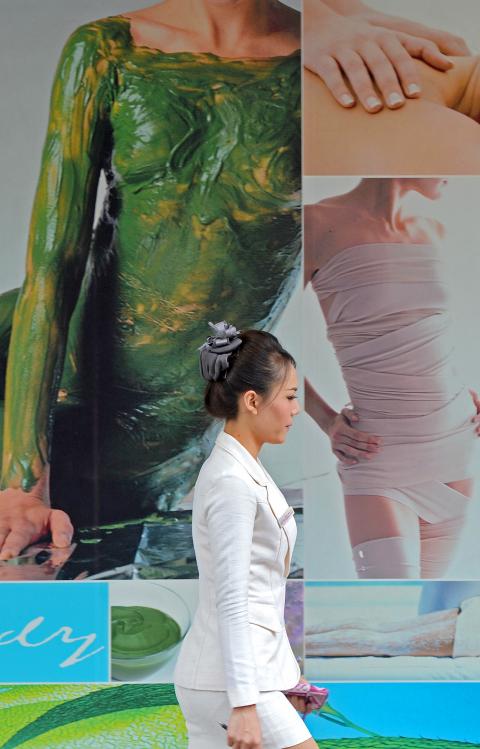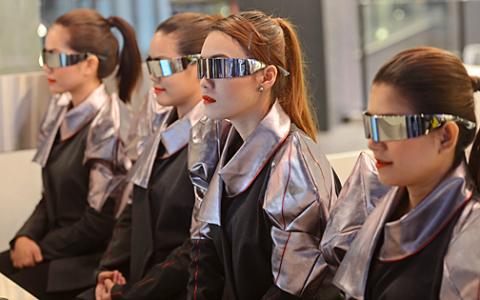From breast-slapping and gold thread face-lifts, to vaginal whitening soaps and olive oil penis enlargements, image obsessed Thais are going to ever increasing extremes in the quest for beauty.
The colorful self-proclaimed pioneer of breast-slapping says her unusual technique allows clients to boost their bust by at least one bra size without surgery.
“This is the beauty by nature — one million per cent guaranteed,” the eccentric 46-year-old, who has changed her name to Khunyingtobnom or Madam breast-slapper, told AFP.

photo: AFP
Her work is also extremely lucrative, charging US$600 for two 15-minute sessions covering one breast each and a premium face-slapping service, which she claims can induce slimness, costing about US$1,000.
Having slapped her customers for 28 years, Khunyingtobnom said that her own small breasts prompted her late-grandmother to pass on the little-known art, which she applies to about 20 customers each day.
In a country where ideals of beauty carry particular weight, even in notoriously image-conscious Asia, it is not only women who are seeking to enhance what nature has provided.

Photo: AFP
Alarmingly high numbers of Thai men inject olive oil, beeswax, silicone and even paraffin into their genitals, in a misguided bid to enlarge their penises, according to one Bangkok urologist.
Skin lesions or serious infections are commonly the result, said Surat Kittisupaporn of the Police General Hospital, which sees up to 300 patients a month after botched penis treatments.
“The body reacts to the foreign substances. When there is chronic irritation or infection, it’ll be very hard to cure ... it’ll be hard to even walk or take a shower,” he said, making surgery inevitable.
In the worst case, Surat was forced to remove a 50-year-old man’s genitals in November after he repeatedly injected olive oil into his penis.
The pursuit of an ideal beauty has a long history in the nation, according to Professor Suwirakorn Ophaswongse, of the Dermatological Society of Thailand.
“It starts from the belief that aristocrats should have white skin and people with dark skin are lower class,” she said.
The influence of Korean pop culture has hastened the pace - and boosted the numbers — of those dashing to the cosmetic surgeon, she said, as Thais now seek to recreate the surgically enhanced, doll-like appeal of their K-pop idols.
Illegal, backstreet cosmetic surgery clinics are cashing-in on that desire and increasing the risks.
A product promoter, or a so-called “pretty,” died in October when a gel-like filler meant to make her buttocks more shapely was injected into her bloodstream.
Her friend and fellow “pretty,” Nutchanunt Angkuttarothum, 25, said the tragedy had not deterred her from further surgery to add to a litany of procedures, including a nose job she has already undergone.
“We have to always take care of ourselves and look good, otherwise we wouldn’t look different from others,” she said after pouting for the cameras at a recent motorcycle launch event in Bangkok.
For women, the quest for bigger eyes, noses, breasts and bums is just one step in a wider bid to transform themselves.
Off-the-shelf skin whitening creams, including vaginal bleaching soaps, abound in the kingdom with many believing that a lighter skin reflects higher status and is more attractive to the opposite sex.
It is an image of desirability reinforced by the legions of models and actors who adorn Bangkok’s billboards and star in the country’s wildly popular television dramas.
For the city’s strutting elite, known as Hi-Sos (High Society), more upmarket treatments are widely available, for the right price.
Anywhere between US$13,000 and US$200,000 will pay for gold thread face implants, a tradition apparently stretching back to ancient Egypt which its adherents believe tightens and brightens the skin.
Speaking at a upmarket Bangkok clinic, husband and wife Patcharat and Itsaraporn Rattanasuthaphaboon said they have both undergone the costly procedure.
“I used to have wrinkles and dry skin under my eyes but it has been a lot better since I did it last time,” said 51-year-old Itsaraporn.
“It’s okay by me,” her husband said. “I just want my wife to look good.”
The treatment involves strips of near-pure gold being sewn into the skin forming a mesh which stimulates the body to produce collagen, thus keeping the skin supple, says Maciej Lichaj, a Polish gold thread aesthetician at the clinic.
“People in Asia love gold ... they want to have gold outside and inside,” he explained, adding the results can be seen within months.
But not everyone is convinced by the scramble to be young, fair-skinned and beautiful.
“People don’t have to be white to be beautiful — good personality, having knowledge and other capacities are much more important,” Professor Suwirakorn said. “It’s better to have beauty from within.”

On April 26, The Lancet published a letter from two doctors at Taichung-based China Medical University Hospital (CMUH) warning that “Taiwan’s Health Care System is on the Brink of Collapse.” The authors said that “Years of policy inaction and mismanagement of resources have led to the National Health Insurance system operating under unsustainable conditions.” The pushback was immediate. Errors in the paper were quickly identified and publicized, to discredit the authors (the hospital apologized). CNA reported that CMUH said the letter described Taiwan in 2021 as having 62 nurses per 10,000 people, when the correct number was 78 nurses per 10,000

As we live longer, our risk of cognitive impairment is increasing. How can we delay the onset of symptoms? Do we have to give up every indulgence or can small changes make a difference? We asked neurologists for tips on how to keep our brains healthy for life. TAKE CARE OF YOUR HEALTH “All of the sensible things that apply to bodily health apply to brain health,” says Suzanne O’Sullivan, a consultant in neurology at the National Hospital for Neurology and Neurosurgery in London, and the author of The Age of Diagnosis. “When you’re 20, you can get away with absolute

When the South Vietnamese capital of Saigon fell to the North Vietnamese forces 50 years ago this week, it prompted a mass exodus of some 2 million people — hundreds of thousands fleeing perilously on small boats across open water to escape the communist regime. Many ultimately settled in Southern California’s Orange County in an area now known as “Little Saigon,” not far from Marine Corps Base Camp Pendleton, where the first refugees were airlifted upon reaching the US. The diaspora now also has significant populations in Virginia, Texas and Washington state, as well as in countries including France and Australia.

May 5 to May 11 What started out as friction between Taiwanese students at Taichung First High School and a Japanese head cook escalated dramatically over the first two weeks of May 1927. It began on April 30 when the cook’s wife knew that lotus starch used in that night’s dinner had rat feces in it, but failed to inform staff until the meal was already prepared. The students believed that her silence was intentional, and filed a complaint. The school’s Japanese administrators sided with the cook’s family, dismissing the students as troublemakers and clamping down on their freedoms — with